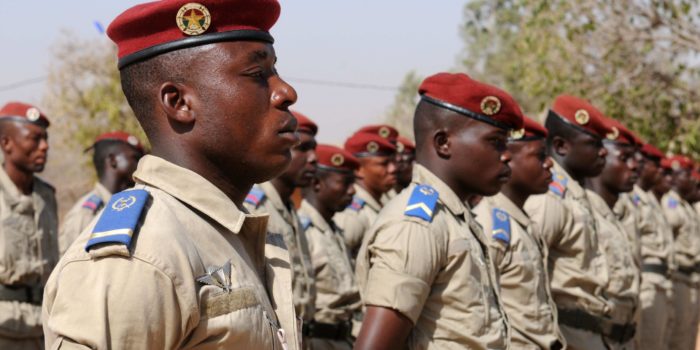Photo: Burkina Faso soldiers stand in formation. Credit: Picryl/U.S. Army photo
On Jan. 28, Mali, Burkina Faso and Niger in a televised statement withdrew from the Economic Community of West African States (ECOWAS). This comes after the three nations withdrew from the G5 Sahel – a coalition of five West African States formed under the pretext of tackling Islamic insurgencies in the region. The newly formed Alliance of the Sahel States (AES) went on to state that the G5 Sahel as an “organization is failing to achieve its objectives. Worse, the legitimate ambitions of our countries, of making the G5 Sahel a zone of security and development are hindered.” After withdrawing, the remaining members of the G5 Sahel, Chad and Mauritania, effectively dissolved the coalition on Dec. 6.
The additional blow to ECOWAS signals further detachment from these Western-backed African institutions. In their televised statement, the AES put forth that ECOWAS “has moved away from the ideals of its founding fathers and Pan-Africanism. Furthermore, ECOWAS, under the influence of foreign powers, betraying its founding principles, has become a threat to its member states and its population whose happiness is supposed to ensure.” This statement reflects an affirmation of the military governments to prioritize their national sovereignty and responsibility to chart an independent path from Western-backed, puppet institutions.
AES looks to alternative economic and political partners independent from the West
Before the departure, there had been continuous measures taken to strengthen the region’s connections outside of the West. Mutual cooperation economically, politically, and technologically between the Sahel countries and countries like Russia, China, and recently Iran, present new opportunities for the AES.
On Jan. 25, a ceremony between Russia and Burkina Faso’s Minister of Foreign Affairs, Regional Cooperation, Karamoko Jean Marie Traore and its Minister of Communications, Culture, Arts and Tourism Rimtalba, Jean Emmanuel Ouedraogo took place. Its outcome resulted in a donation of 25,000 tons of whole grain shipped to Burkina Faso’s capital, Ouagadougou. Russia also deployed 100 troops to the capital city as well. This follows the July 2023 Second Russia-Africa summit where nations like Somalia also received 25,000 tons of wheat, while Russia also focused on increasing supplies of wheat, fertilizer, and fuel to Mali.
In an interview, transitional president of Burkina Faso, Captain Ibrahim Traore, rejected allegations made by president of Ghana Nana Akufo-Addo regarding Burkina Faso’s purported involvement with Russian mercenaries, Wagner Group. Traore expressed the transitional government’s deep commitment to Burkina Faso’s sovereignty stating, “If it was a deal to serve one master in place of another, I would have rather died than do that because we say our ‘homeland or death’.”
Toward the end of January, the newly-appointed Prime Minister of Niger, Ali Lamine Zeine, visited Iran and met with President Ebrahim Raisi. They inked several deals which expanded cooperation in the economic, political, and health sectors. Iran also began preliminary steps to reopen Niger’s embassy in Tehran, which signals a move to strengthen the two country’s growing relations. Iran’s first vice president, Mohammad Mohkber, expressed Iran’s willingness to help Niger overcome punitive economic measures imposed by Western-backed ECOWAS following the popularly supported coup in Niger last July. Mobkhber highlighted his country is opposed to the “cruel sanctions which are imposed by the dominant system.” Despite the levied sanctions to one of the poorest nations in the world, the people of Niger, even in the face of rising food and medicine prices, are committed to the process of charting a new course independent from Western directives.
EU-backed immigration law overturned, last of French troops exit Niger
Niger further signaled a departure from European directives in November by overturning a 2015 law that criminalized migration through the Agadez hub. This has forced thousands to travel through far more dangerous desert pathways in other countries, and destroyed the economy of Agadez and nearby areas. Because European countries wanted Niger to stem the flow of migrants from Africa, they compelled the country to pass this law, which prosecuted many nationals for simply cooking meals or giving rides to migrants. Now, Western media outlets are sounding the alarm and fearmongering over supposed dangerous influxes of migrants, but local residents celebrate.
In December of last year, the last of the French troops in Niger were recalled. While France and the rest of the West question the legitimacy of Niger’s government, it is this government with which the French removal had to be negotiated. This has dealt another blow to France’s colonial influence in West Africa. Mali and Burkina Faso between 2020 and 2022 had severed military ties with France with a complete withdrawal occurring in Mali in August 2022, and Burkina Faso in February 2023. The withdrawal of French troops came after many popular protests were held in each nation’s capital condemning the failure of France to effectively stop the Islamist insurgencies. In fact, many people throughout these popular protests expressed similar sentiment (alongside the transitional governments) pointing to an increase of Islamist insurgencies, which spread throughout the Sahel under France’s deployment of troops into the region.
The West and Western-backed ECOWAS attempt to criticize, sanction, and demonize the sovereign steps being taken by the newly formed AES. Despite the backlash, it is clear that the transitional governments of Mali, Burkina Faso and Niger are supported by people’s movements and organizations. Thousands of supporters alongside these movements hail these moves as the correct step towards an anti-imperialist path that will bring dignity, economic and political security to the people living in the Sahel.
Source link : https://www.liberationnews.org/mali-burkina-faso-and-niger-leave-ecowas-what-moves-are-being-made-in-the-region/
Author :
Publish date : 2024-02-08 08:00:00
Copyright for syndicated content belongs to the linked Source.





